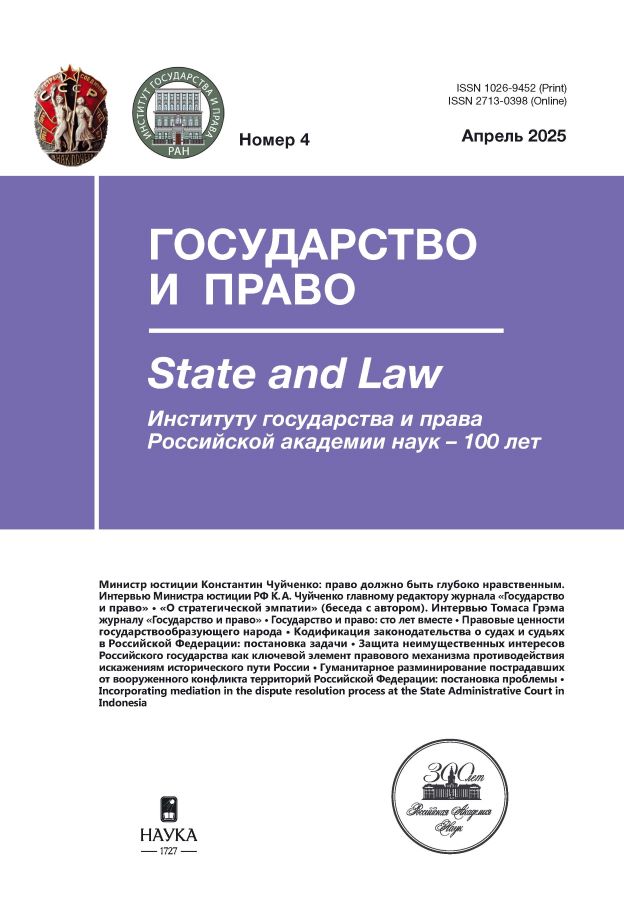Institutional and procedural-legal inadmissibility of classifying an investigator as a party in criminal proceedings in Russia
- Авторлар: Soloviev S.A.1
-
Мекемелер:
- State Academic University for the Humanities
- Шығарылым: № 4 (2025)
- Беттер: 108-116
- Бөлім: Strengthening of legality and struggle with criminality
- URL: https://cardiosomatics.ru/1026-9452/article/view/684929
- DOI: https://doi.org/10.31857/S1026945225040083
- ID: 684929
Дәйексөз келтіру
Аннотация
The attribution of a participant in criminal proceedings to a party in the context of the provisions of part 45 of Article 5 of the Code of Criminal Procedure of the Russian Federation is usually formulated through the analysis of its functions in criminal proceedings, which, in our opinion, directly contradicts both the above-mentioned criminal procedure norm and the provisions of paragraph 3 of Article 123 of the Constitution of the Russian Federation. Only in the situation of adversarial procedure implementation for a criminal law dispute resolution between a representative of the state in the person of the public prosecutor deprived of procedural authority and the accused with his defender, who do not have such a priori, it is possible to characterize these participants in the criminal process as a party. The purpose of the study is to prove the essential impossibility of classifying an investigator as a party in criminal proceedings in Russia, including the inadmissibility of classifying him as a criminal prosecution body and also to substantiate the institutional affiliation of the preliminary investigation bodies to the judicial vertical bodies endowed by the state with authority to implement the criminal case resolving function within their competence, which will preserve the criminal proceedings functions trinity in the form of prosecution, protection and resolution of a criminal case. The main research methods are system-structural analysis, synthesis, and induction. There is an application of axiomatic, special legal and logical research methods. According to the results of the study, conclusions are formulated about the possibility of classifying a participant in criminal proceedings as a party to a criminal dispute, depending on the characteristics of the stage of the criminal process, the presence in it, in addition to the court, two procedural-powerless disputing parties, one of which implements the criminal prosecution function, and the other – the protection from a criminal claim function. The legislator’s attribution of the investigator to the prosecution side not only does not reflect the real state of affairs in criminal proceedings, but also forms a set of normative contradictions concerning the institutional affiliation and functional content of the preliminary investigation bodies. In a functional and institutional sense, the return of the investigator to the bodies endowed by the state with a criminal case resolving function (judicial authorities) will ensure its normatively fixed functional impartiality.
Толық мәтін
Авторлар туралы
Sergey Soloviev
State Academic University for the Humanities
Хат алмасуға жауапты Автор.
Email: solovievsa@gaugn.ru
PhD in Law, Researcher of the Department of Public Law, the Faculty of Law
Ресей, 26, Maronovsky Lane, Moscow, 119049Әдебиет тізімі
- Bergel J.-L. General theory of law / under the general ed. of V. I. Danilenko; transl. from French. M., 2000. P. 33 (in Russ.).
- Vilkova T. Yu. Principles of criminal justice in Russia: legal foundations, content, guarantees. M., 2015. P. 190 (in Russ.).
- Golovko L. V. The state and its Criminal Proceedings. M., 2022. Pp. 178–180, 220, 244, 264, 285, 306–325 (in Russ.).
- Lazarev V. V. Search for law // Journal of Russ. law. 2004. No. 7. Pp. 3–14 (in Russ.).
- Rossinskaya E. R., Galyashina E. I. The judge’s desk book: judicial expertise. M., 2015. P. 5 (in Russ.).
- Rossinsky S. B. Pre-trial proceedings in a criminal case: the essence and methods of collecting evidence. M., 2021. P. 17 (in Russ.).
- Smirnov A. V., Kalinovsky K. B. Criminal procedure: textbook. / under the general ed. of A. V. Smirnov. 7th ed., rev. M., 2017. Pp. 68–84 (in Russ.).
- The Soviet Criminal Process. Kiev, 1978. P. 67 (in Russ.).
- Soloviev S. A. Favoring protection as a procedural mechanism for ensuring equality of parties in Criminal Proceedings in Russia: dis. … PhD in Law. M., 2019. P. 318 (in Russ.).
- Soloviev S. A. The Grand Inquisitor: investigative authorities in Russia against the great equalizer – the jury trial // Justice of the Peace. 2020. No. 11. Pp. 30–34 (in Russ.).
- Soloviev S. A. The concept of “party” in Criminal Proceedings in Russia // The Rule of Law: theory and practice. 2024. No. 1 (75). Pp. 126–132 (in Russ.).
- Strogovich M. S. The right of the accused to defense and the presumption of innocence / ed. by V. M. Savitsky. M., 1984. Pp. 45, 46 (in Russ.).
- Tarasov A. A. Investigator – participant in the trial on the prose-cution side: evil or good? // Journal of Russ. law. 2024. Vol. 28. No. 8. Pp. 113–126 (in Russ.).
- Theory of criminal procedure: competitiveness / ed. by N. A. Kolokolov. M., 2013. Part. I. P. 81 (in Russ.).
- Foinitsky I. Ya. Course of Criminal Proceedings. 2nd ed., rev. St. Petersburg, 1896. Vol. I. P. 159 (in Russ.).
- Foinitsky I. Ya. Course of Criminal Proceedings. SPb., 1996. Vol. 2. P. 4 (in Russ.).
- Shakaryan M. S. The doctrine of the parties in the Soviet Civil Process: textbook. M., 1983. P. 3 (in Russ.).
- Sharipova A. R. Conceptual foundations of intersectoral convergence in criminal court proceedings: abstract … Doctor of Law. N. Novgorod, 2022. P. 5 (in Russ.).
- Pradel J. Procédure pénale. 15 éd. Paris, 2010. Pp. 27, 28.
Қосымша файлдар









